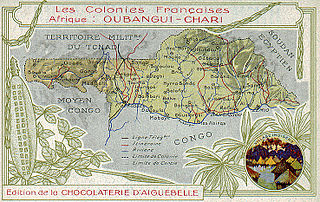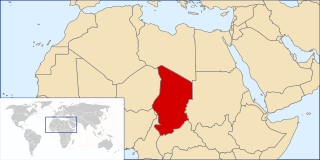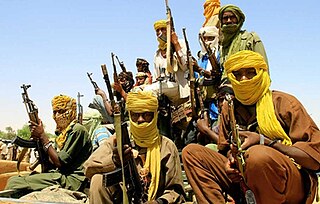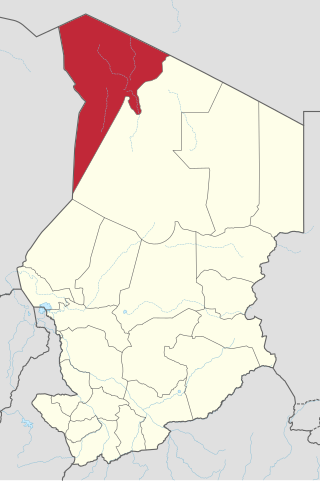| |||||
| Decades: | |||||
|---|---|---|---|---|---|
| See also: | Other events of 2006 History of the Central African Republic | ||||
The following lists events that happened during 2006 in the Central African Republic .
| |||||
| Decades: | |||||
|---|---|---|---|---|---|
| See also: | Other events of 2006 History of the Central African Republic | ||||
The following lists events that happened during 2006 in the Central African Republic .
Chad, officially the Republic of Chad, is a landlocked country in Central Africa. It borders Libya to the north, Sudan to the east, the Central African Republic to the south, Cameroon and Nigeria to the southwest, and Niger to the west. Due to its distance from the sea and its largely desert climate, the country is sometimes referred to as the "Dead Heart of Africa".

The history of the Central African Republic is roughly composed of four distinct periods. The earliest period of settlement began around 10,000 years ago when nomadic people first began to settle, farm and fish in the region. The next period began around 10,000 years prior.

Idriss Déby Itno was a Chadian politician and military officer who was the 6th president of Chad from 1991 until his death in 2021 during the Northern Chad offensive. His term of office of more than 30 years makes him Chad's longest-serving president.

The Lord's Resistance Army insurgency is a conflict involving the Lord's Resistance Army against the government of Uganda. Following the Ugandan Civil War, militant Joseph Kony formed the Lord's Resistance Army and launched an insurgency against the newly installed President Yoweri Museveni. The stated goal was to establish a Christian state based on the Ten Commandments. Currently, there is low-level LRA activity in eastern areas of the Democratic Republic of the Congo and the Central African Republic. Kony proclaims himself the 'spokesperson' of God and a spirit medium.

The Chadian Civil War of 2005–2010 began on December 18, 2005. Since its independence from France in 1960, Chad has been swamped by civil wars between the Arab-Muslims of the north and the Sub-Saharan-Christians of the south. As a result, leadership and presidency in Chad drifted back and forth between the Christian southerners and Muslim northerners. When one side was in power, the other side usually started a revolutionary war to counter it.

Birao is the capital of Vakaga, one of the 14 prefectures of the Central African Republic and was an administrative post in the colony of Ubangui-Shari. In March 2007, the town was almost completely burnt down in the fighting between rebels and government troops in the area.

Bossangoa is the capital of Ouham, one of the 14 prefectures of the Central African Republic. The town has a population of 36,478. It is located 303 km (189 mi) north of the country's capital, Bangui. The Ouham River passes through Bossangoa and on through a number of waterfalls east of the city before turning north to join the Chari River in Chad.
The Battle of N'Djamena took place between the forces of the revolutionary United Front for Democratic Change (UFCD) and the military of Chad that occurred on 13 April 2006 when rebel forces launched an assault on the capital of Chad in the pre-dawn hours, attempting to overthrow the government of President Idriss Déby Itno from their bases an estimated thousand miles east.

The War in Darfur, also nicknamed the Land Cruiser War, was a major armed conflict in the Darfur region of Sudan that began in February 2003 when the Sudan Liberation Movement (SLM) and the Justice and Equality Movement (JEM) rebel groups began fighting against the government of Sudan, which they accused of oppressing Darfur's non-Arab population. The government responded to attacks by carrying out a campaign of ethnic cleansing against Darfur's non-Arabs. This resulted in the death of hundreds of thousands of civilians and the indictment of Sudan's president, Omar al-Bashir, for genocide, war crimes, and crimes against humanity by the International Criminal Court.

The Chadian–Libyan War was a series of military campaigns in Chad between 1978 and 1987, fought between Libyan and allied Chadian forces against Chadian groups supported by France, with the occasional involvement of other foreign countries and factions.

The Central African Republic Bush War was a civil war in the Central African Republic which lasted from 2004 to 2007 between Union of Democratic Forces for Unity (UFDR) rebels and government forces. The rebellion began after François Bozizé seized the nation's presidency in 2003. Actual fighting began in 2004. Around 10,000 people were displaced because of the civil unrest.
Events from the year 2007 in Chad.
The Union of Resistance Forces is an alliance of Chadian rebel groups.

The Sudanese conflict in South Kordofan and Blue Nile was an armed conflict in the Sudanese states of South Kordofan and Blue Nile between the Sudanese Armed Forces (SAF) and the Sudan People's Liberation Movement–North (SPLM-N), a northern affiliate of the Sudan People's Liberation Movement (SPLM) in South Sudan. After some years of relative calm following the 2005 agreement which ended the second Sudanese civil war between the Sudanese government and SPLM rebels, fighting broke out again in the lead-up to South Sudan independence on 9 July 2011, starting in South Kordofan on 5 June and spreading to the neighboring Blue Nile state in September. SPLM-N, splitting from newly independent SPLM, took up arms against the inclusion of the two southern states in Sudan with no popular consultation and against the lack of democratic elections. The conflict is intertwined with the War in Darfur, since in November 2011 SPLM-N established a loose alliance with Darfuri rebels, called Sudan Revolutionary Front (SRF).

The Mali War is an ongoing conflict that started in January 2012 between the northern and southern parts of Mali in Africa. On 16 January 2012, several insurgent groups began fighting a campaign against the Malian government for independence or greater autonomy for northern Mali, which they called Azawad. The National Movement for the Liberation of Azawad (MNLA), an organization fighting to make this area of Mali an independent homeland for the Tuareg people, had taken control of the region by April 2012.

The Central African Republic Civil War is an ongoing civil war in the Central African Republic (CAR) involving the government, rebels from the Séléka coalition, and Anti-balaka militias.

An internal conflict in the Central African Republic (CAR) started essentially on 13 April 2013, when the government of President Michel Djotodia officially took over. The fighting was between the government of the Central African Republic's former Séléka coalition of rebel groups, who are mainly from the Muslim minority, and the mainly Christian anti-balaka coalition. The conflict was part of the ongoing Central African Republic Civil War (2012–present). International organisations, such as the United Nations, had warned of a possible genocide. UNSC resolution 2122 authorised the African-led International Support Mission to the Central African Republic (MISCA) to be deployed to the country, and France to lead operations with additional troops sent to bolster its force in the country. Following a summit of Economic Community of Central African States (CEEAC), including the attendance of all the country's MPs, Djotodia resigned from the presidency on 10 January 2014. The National Transitional Council chose Bangui mayor Catherine Samba-Panza as interim president on 20 January 2014. A period of lawlessness prevailed during the early days of her presidency with people moving into religiously cleansed neighbourhoods as the UN warned of a genocide. Anti-Balaka attacks continued against Muslim civilians.

The Northern Chad offensive was a military offensive in Northern Chad, initiated by the Chadian rebel group Front for Change and Concord in Chad (FACT), took place from 11 April to 9 May 2021. It began in the Tibesti Region in the north of the country following the 2021 Chadian presidential election.

In 2016, the Front for Change and Concord in Chad (FACT) and the Military Command Council for the Salvation of the Republic (CCMSR) began a rebellion against the Chadian government. From their rear bases in southern Libya, FACT and CCMSR have launched offensives and raids into Northern Chad seeking to overthrow the government of former president Idriss Déby, who had been in power since a December 1990 coup. Other rebel groups are also involved in the insurgency, though to a lesser extent.
In March 2022 Russian mercenaries from Wagner Group supported by armed forces launched an offensive against armed groups in the northeastern parts of the Central African Republic (CAR) during which they killed dozens of rebels and possibly hundreds of civilians including citizens of Chad, Niger, Sudan and CAR who were working there as artisanal miners, herders and camel drivers while displacing thousands. The events have been described by multiple sources including domestic in the Central African Republic as well as in Sudan based on survivor testimony.